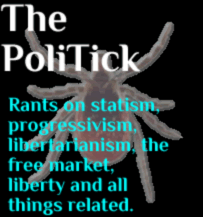What did our Founding Fathers mean by "general Welfare?"
The author of this article argues that the "general welfare" could be reconstrued to mean anything by later generations, since the Founders (aside from Hamilton) could not anticipate the evolution of the nation from agrarian to industrial society. For this reason, only Hamilton's pro-taxation, pro-regulation interpretation of the General Welfare Clause is valid.
Here's my response.
I beg to differ. Regardless of how the country was expected, by various personages, to evolve, the difference between "special" and "general" remains intact. The general welfare can only be the welfare of the entire nation. To the Founders (except quite possibly Hamilton), this meant one and only one thing: a free market. The expression "life, liberty and property," later bowdlerized as "life, liberty and the pursuit of happiness," was intended to define such a market, the kind of market that the revolutionaries--young and old, rich and poor--sought to secure for themselves. Not only in the nation's Declaration of Independence, but also in various Declarations of Rights published by cities and colonies throughout the 1770s, does this expression occur. To the Founders, freedom meant a free market. And the various protests from 1773 onward demonstrate clearly that what was being protested was monarchic (state) interference in the market.
To provide for the "common defense" is consistent with the "general welfare," because it benefits all equally. To "secure the blessings of liberty" is as well, and is really just a restatement of the Constitution's mission. Only in a free market--wherein all individuals have property rights, and can pursue employment and / or wealth as they see fit--can liberty be truly secured. As soon as the state begins imposing regulations on the market, property rights begin to become infringed. Every law regarding what you can and cannot do with your own property--including KEEP it--is an infringement of property rights, and would have the Founders spinning in their graves. The fact that this nation operated quite well for a century before imposing a federal income tax--and that, only temporarily--is a strong indication that the government doesn't need income taxes to fund its operations. Only if you start adding "services"--none explicitly authorized in the Constitution, mind you--does it begin requiring things like income tax. And you'll note, that as soon as it begins providing "services," it is no longer serving the GENERAL welfare at all. It is serving special welfare by catering to the demands of special interests.
Welfare entitlements are the very worst offenders, and you'll no doubt be aware that the very label "welfare program" was chosen to exploit the Constitutional language, and not the other way around. In any event, there is a substantial distinction between "promote the general welfare" and "PROVIDE welfare transfer payments." The latter has nothing whatsoever to do with the general welfare.
Income tax is a blank check for government expansion, and that in turn is a guarantee of a continuing erosion of liberties. The Founders, save perhaps only Hamilton, were aware of this. This is why they argued against it (see Madison and Jefferson for particularly eloquent arguments). Positive feedback loops ensure that, no matter how diligently we watch government, and however "well intentioned" its policies are (or claim to be), representation will eventually become more about diverting Treasury largess back to home districts than about preserving liberty. We crossed that threshold long ago.
Sources:
"The Founders clearly understood the “general welfare” to mean the good of all citizens, not an open-ended mandate for Congress. The only good that applies to all citizens is freedom, and government’s proper role is the protection of that freedom. That was the meaning intended by the Founders."
The Founders and the General Welfare
"But admitting the distinction as alleged, the appropriating power to all objects of "common defence and general welfare" is itself of sufficient magnitude to render the preceding views of the subject applicable to it. Is it credible that such a power would have been unnoticed and unopposed in the Federal Convention? in the State Conventions, which contended for, and proposed restrictive and explanatory amendments? and in the Congress of 1789, which recommended so many of these amendments? A power to impose unlimited taxes for unlimited purposes could never have escaped the sagacity and jealousy which were awakened to the many inferior and minute powers which were criticised and combated in those public bodies." -- Letter from James Madison to Andrew Stevenson
Article 1, Section 8, Clause 1: Document 27
"As for property rights, they were at the heart of the dispute which led to the American Revolution. When Americans at the time listed the rights of man, they often said "life, liberty, and property." Boston's 1772 "Rights of the Colonists" were typical: "Among the natural rights of the colonists are these: First, a right to life; secondly to liberty; thirdly to property." As with happiness, this is not a right to property itself, but a right to use one's talents to acquire property, and to use it as one sees fit, as long as one does not injure oneself or others."
among these are Life, Liberty and the pursuit of Happiness

No comments:
Post a Comment